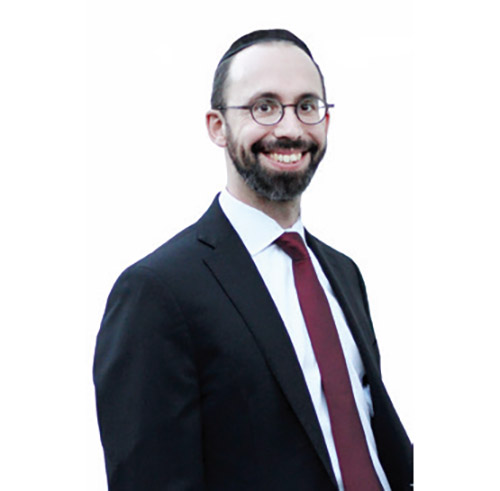
I recently attended a seudas hoda’ah—a meal of thanks to Hashem—hosted by a friend. His family had experienced an extremely challenging year, with accidents and health issues. Thankfully all are well now. The teenage son, who was involved in two accidents, thanked Hashem publicly for the two miracles he experienced. He told us how he heard from a rebbe that he should accept upon himself a small commitment to express gratitude to Hashem. After the first accident he accepted upon himself to be vigilant about not speaking while someone recites Kaddish. After the second accident, he accepted upon himself to recite Birkas Hamazon (blessing after a meal) from a siddur/bentcher rather than from memory.
These were small commitments, but each can be challenging to do consistently! I was so impressed that a young man understood that small but firm actions of commitment are the road to progress.
This lesson is taught in Parshas Ki Seitzei, with the mitzvah to remember Amalek. The Torah stresses that Amalek attacked us while we were traveling on the road. What was so terrible about the “on-the-road” aspect? Rashi points out the word “karcha” is used to describe Amalek approaching klal Yisrael to attack them. The root of the word is kar, cold. After the splitting of the sea, klal Yisrael was untouchable. The nations of the world were terrified of us. Yet, Amalek attacked us specifically to break the image of our being invincible, to “cool down” the other nations’ fear of us. The Midrash compares this to a bubbling hot bath; the first person to jump in gets scalded, but the water is somewhat cooler for the next person.
Amelek does not just represent a nation; it’s an attitude of “cooling down” that pulls us away from Hashem. At times we may get excited by an inspiring event or a shiur or dvar Torah we read. But that inspiration can be fleeting! If we don’t act on it we may cool down and lose that excitement. This is the message of asher karcha baderech for us: continuing on our regular day-to-day course cools us down over time. The only way to keep our fire and inspiration for connecting with Hashem going is to make a positive commitment. Just like my friend’s son did, we need to stop for a moment and change course ever so slightly so we can use the momentary inspiration for actual change.
Another detail the Torah stresses about Amalek is their attacking the individuals traveling in the rear of the group. Amelek could not attack klal Yisrael directly; we were surrounded by the “Clouds of Glory” that created a force field that intercepted every arrow. The only people Amalek was able to attack were those few people who had been expelled from the protection of the Clouds of Glory because of serious sins.
But was Amalek so evil in attacking these sinners? After all, one may argue they created their own fate. It’s not so simple…
I had the privilege of driving Rabbi Yaakov Bender back home to Far Rockaway after giving a shiur at our yeshiva. As we were passing Rikers Island, the famed jail, Rabbi Bender said, “It’s so unfortunate; there are so many Jews incarcerated there.” I was a little taken aback, and asked him, “If someone was incarcerated incorrectly, that’s unfortunate. But those individuals who committed crimes are there for a reason. Why do you feel bad for them?”
“Yes,” Rabbi Bender replied, “but it’s still sad that they are incarcerated and we should still have feelings for them.”
This idea totally expanded my concept of ahavas Yisrael—loving every Jew—to include even loving sinners. Yes, they committed crimes and are being punished. But we still need to care about them. Hashem cares about every Jew, even considering Amalek evil for attacking those who sinned.
Not everyone makes the right decisions or acts properly at all times. Anyone can make a bad decision at a given time. But he’s still a fellow Jew and we still need to feel for him.
This message is one of the keys to prepare for Rosh Hashanah. We are going to plead to Hashem to judge us favorably. Hashem will take out the video and replay our actions from last year. In some cases we will be ashamed to watch. We want and need Hashem to look favorably on us. Rav Moshe Cordevero tells us that the way we relate to others is how Hashem relates to us. Although we might have committed certain sins, we still want Hashem to have compassion on us.
Let’s start with that concept. Recognize that we all need to be forgiven for one or more past actions, so we should take the initiative and open compassionate hearts to those around us. Hashem in turn will do the same for us.
By Rabbi Baruch Bodenheim
Rabbi Baruch Bodenheim is the associate rosh yeshiva of Passaic Torah Institute (PTI)/Yeshiva Ner Boruch. PTI has attracted people from all over northern New Jersey, including Teaneck, Paramus, Rockaway and Fair Lawn. He initiated and continues to lead a multi-level Gemara-learning program. Recently he has spread out beyond PTI to begin a weekly beis midrash program with in-depth chavrusa learning in Livingston, Fort Lee and a monthly group in West Caldwell. His email is rb@ptiweb.org.











